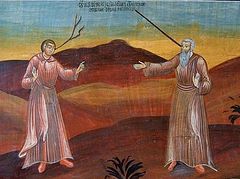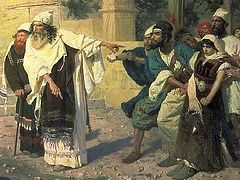Let’s look at the 45th chapter of the work of St. Nikodemos of the Holy Mountain, Unseen Warfare, which speaks of condemning others.
Condemnation is a very pleasant occupation for us. However, we must pay attention to this problem, because condemnation is a manifestation of our egotism. If we mercilessly and severely judge our brothers, that means we are full of egotism, and we must undertake serious spiritual work. Christ said: Judge not, that ye be not judged (Mt. 7:1). Sacred Scripture speaks many times about condemnation, and the Holy Fathers always warn about the danger of it.
Here is what St. Nikodemos of the Holy Mountain says about condemnation: “From vanity and conceit, another evil is engendered in us, causing us harm, namely severe judgment and condemnation of others, by which we regard them as nothing, scorn them, and, if an occasion arises, humiliate them. This evil habit, derived from pride, is nourished and nurtured by it, for pride increases after every condemnation, because of the accompanying action of self-gratification.”
Pride is the mother of condemnation—it is egotism, and egotism is a concentration of evil within us, thus condemnation leads to the separation of man from God and causes many temptations. Condemnation destroys a man.
Once Elder Ephraim of Katounakia told us how one monk, living with him then in the skete of Katounakia, would ring little bells before the evening and morning services, like they ring for services in the monasteries, in order to somewhat break up the monotony of the deserted habitation. Another brother hermit, who lived across from him, hearing the ringing of the bells, began to condemn his brother. Then the first monk, seeing the soul of his brother fallen away from the grace of God because of condemnation, was very sorrowful. Truly, condemnation drives Divine grace and Divine care for us away from us. Condemnation begins with pride, and pride is nothing other than the absence of love. A proud man does not love his neighbor. And when we condemn our brothers, it means that we don’t love them. If we loved our brother, we wouldn’t condemn him. Even if we clearly saw some flaw in our neighbor, we would find a justification for it and cover it. Christ Himself, being on the Cross and preparing to give His soul over to the Lord, thought of His crucifiers. He didn’t speak poorly of and condemn them, but on the contrary: Father, forgive them; for they know not what they do (Lk. 23:34). He justified them.
Also, the first martyr Stephen, the protodeacon, said with his last breath after being stoned by the Jews: Lord, lay not this sin to their charge (Acts 7:60). St. Stephen took care that the people did not have a sin before the Lord. Such behavior from the saints testifies to their love for others. After all, Jesus Christ is true love and is the model for life and perfection for us. The saints of God didn’t condemn even the devil.
Elder Paisios said: It’s not enough for me to go to hell for my sins. I will go to hell because my sinful life is a temptation for other people, because I provoke even the devil himself. If I didn’t give him a reason, he wouldn’t tempt me, and my falls wouldn’t have caused the fall of this unfortunate one. That is, he considered himself guilty in the sin of the devil, that the devil was bothering him and led him to sin, and the devil thereby sinned more.
The saints never condemned, not because they watched themselves closely, but because they had great love. Like a mother who, no matter what her children do, never condemns them, but justifies them. I remember one time the mother of a problematic child who had done some very bad things, practically crimes, came and told me about him, weeping and justifying him: “Father, I’m his mother after all. I can’t leave him.” Indeed, a mother can’t reject her son, can’t condemn him, because she’s his mother and loves him. We should have such motherly love for our neighbors and not condemn anyone.
When we notice that we’re condemning our neighbor, we have to understand that we’re suffering from spiritual immaturity. We haven’t become spiritual people yet and therefore we easily reject and condemn others.
St. Nikodemos of the Holy Mountain also says: “Giving ourselves a high value and thinking highly of ourselves, naturally, we look down on others, condemning and despising them, because we think we’re far from those shortcomings that we think are familiar to others.” We think highly of ourselves. We think we have none of those shortcomings that our neighbors have. For example, someone condemns an alcoholic, saying various nasty things about him, considering himself higher, because he doesn’t have this passion. Sure, maybe you’re not an alcoholic who abuses alcohol, but you’re an alcoholic in your other passions and sins, which might be even worse. After all, whoever has a high idea about himself is guilty before God. A man who is aware of his many shortcomings will never condemn someone else. And conversely, whoever thinks he’s pure easily starts condemning others, thinking he is free from a particular sin. Logically, he seems to be pure, but from a spiritual point of view—no. It’s a crime against God’s commandments.
In fact, all of this is the work of the enemy of mankind, as St. Nikodemos writes: “And here also, our all-evil enemy, seeing such a bad disposition, vigilantly stands near, and opening our eyes, teaches us to attentively follow what others do and say.” St. Nikodemos’ remark here expresses our reality quite accurately. There are people, and we often find ourselves among them, who constantly notice others’ shortcomings. They are like flies that fly around looking for filth. But St. Paisios says that “we need to have a factory of good thoughts within ourselves,” that is, our minds must produce good thoughts, because when our minds produce evil thoughts, then everything is distorted within us, and our soul, our heart, our eyes, and everything within us suffers.
How can a man learn to produce good thoughts? Above all, he must sit and think: “Lord, how many sins I have!” I remember how conversations with the brothers would sometimes turn to talking about someone, and Elder Joseph of Vatopedi of blessed memory would say to us: “Brothers, do you really not have enough of your own sins? Do we need to be occupied with others? We must weep for our sins, and not be occupied with the sins of our brother.” The saints saw themselves as great sinners. Seeing our own sins and our weaknesses helps us avoid condemning, so our souls, our minds, our hearts would land on the airfield of the humility of our Lord Jesus Christ, Who will put wonderful thoughts in us.
First of all, we must realize that every one of us has many sins. Perhaps our sins are different from the sins of our neighbor whom we are condemning, but that does not matter. What’s important is only that we are sinful before God, and some of our sins are much worse than the sins of our neighbor. It also happens that although our brother committed some sin, he repented of it. In condemning, we do not repent and thereby sin even more.
Then, feeling the depth of our falls and realizing our sinfulness, we grieve strongly. Having begun to grieve for our sins, we resort to prayer and spiritual work begins. Then every desire to open our mouths against another disappears, for in condemning him, in fact, we condemn ourselves and drive away the grace of God.
Further, St. Nikodemos says that when you intend to condemn, you must remember “that you are not given the authority and that by appropriating this authority to yourself, you make yourself worthy of judgment at that moment.” It turns out we don’t even have the right to judge, must less to condemn, because the authority to judge is held by the only righteous Judge—our Lord, for only He knows how things really are. We see things from the outside. For example, we see an angry person who yells and waves his arms, but we don’t see why he’s acting that way. We don’t know where he was born, what conditions he grew up in, what kind of heredity he has, and what’s in his soul. We also cannot know about his subsequent repentance. As St. Paisios said: Someone who could have committed twenty crimes but only committed nineteen has taken a step forward. And conversely, a holy man who had the opportunity to perform twenty miracles but only performed nineteen is less pleasing in the eyes of God, although his nineteen miracles have great value for people. Therefore, the judgment of God and of man are different. The Lord says to us in the Gospel: Judge not according to the appearance, but judge righteous judgment (Jn. 7:24). Our judgment must be righteous, but we don’t have such judgment.
You’ll say there are times when we are forced to judge. That’s true. Judgment is a mental process. Whether we want to or not, we have our judgment about other people or things, but it’s necessary to make sure our judgment doesn’t move into condemnation. For example, someone comes to us and offers to sell us drugs. Having a negative attitude towards drugs, we refuse. That I refused means it’s unacceptable for me. We need this kind of discernment. It’s another matter when I start to condemn someone who offers drugs, calling him a scoundrel, and so on. That’s already condemnation. Judgment without passion and without malice is good for us. To understand that one is good and the other is bad, I must judge. Judgment is a natural property of reason—a criterion that helps us distinguish right from wrong.
Then St. Nikodemos says: “Equally very strong, is never to let go from your mind the memory of your own wickedness, your unclean and evil passions and actions…” that are so numerous and hidden that an entire lifetime is not enough to know them and heal them—let alone to leave enough time to look at the sins of another.
St. Nikodemos also says: “When you strictly judge the evil deed of your neighbor, know that there is a root of the same evil in your heart which by its vehemence teaches you to speculate about and condemn others.” Man, having a passion, sees this passion in all people. As the ancient Greeks said: “Don’t judge everyone by your own standard.” For example, someone has a passion for theft, and upon entering a room, he starts looking around and taking note of various things. And seeing another person with a similar manner, he says he is a thief. Inasmuch as he himself is a thief, He begins to suspect others of the same. Or some lascivious person, seeing other people communicating and having a good time, will think some vulgarity about them. Holy people have a completely different view. Even seeing some evil deeds, their minds don’t notice anything bad. Recall the scene from the life of the blessed Elder Iakovos of Euboea, our contemporary, when he, having encountered a young boy and girl kissing on the street, said they’re probably brother and sister. His mind couldn’t think anything else, because he was a pure person. It’s what Christ spoke about: When thine eye is single, thy whole body also is full of light; but when thine eye is evil, thy body also is full of darkness (Lk. 11:34). Therefore, the Church teaches us to avoid looking at others, because we thereby ruin our vision and see our neighbor through the prism of evil. We look at others with physical, passionate eyes, while the eyes of the saints were holy, pure, and even when seeing impurity, did not notice it.
“By doing this, you will turn against yourself the weapon, which evil thought urges you to use against another; and instead of wounding your brother you will put plasters on your own wounds,” writes St. Nikodemos. An evil thought that induces you to condemn, humiliate, and repulse your brother, must be turned against yourself and you should say that I myself am the reason for every evil, and I must turn my gaze to my own sins and falls, to belittle myself and come before God.
“Therefore,” says St. Nikodemos, “ever stand with fear and trembling, fearing more for yourself than for someone else. And be sure that every good word about another and every rejoicing for his sake is the action and fruit of the Holy Spirit in you, as, on the contrary, every bad word about him and the contemptuous condemnation of him comes from your depravity and suggestions from the devil.” It’s a very good secret St. Nikodemos has told us—to learn to speak well of our neighbors. When we are asked about others, we should say only good things, even if we exaggerate a little bit. He who praises his brother possesses great virtue. There’s a wonderful story in the Paterikon, how some pilgrims came to an elder once and said: “We’re looking or Abba Pimen.” This elder was a great ascetic. He started praising Abba Pimen, saying they definitely had to meet with him and that when they saw him, they should ask him to pray for him. When the pilgrims met with Abba Pimen, they told him: “Abba, before we found you, we went to see an elder who lives near here, and he told us many good things about you.” Then the abba smiled and answered: “He that praises his brother is higher than he who is praised.” Unfortunately, it’s often hard for us to praise others in life. It’s much easier to let off a few degrading phrases. Or we could say: Okay, sure, he’s good, but… and then we start telling you why “but.” Holy people acted differently—they praised their brothers. Elder Paisios was a very vivid example of this—he always praised people, even those monks who weren’t the best examples of the monastic life. Elder Paisios always found a reason or two to praise them, to justify them and say something nice to them.
When you learn to praise others, you slowly get used to having good thoughts about people. This habit is medicine for condemnation, so it’s helpful to learn it and always use it. There are people who have managed to thrive in this virtue. I remember in school we had a teacher, Fr. Diogenes, who taught us the Law of God. This teacher spoke about everyone in superlatives. When they would ask him: “Batiushka, is this a good man?” he would answer: “Very good!” “But, Batiushka, you always say that.” “No, it’s true. He’s a very, very good person.” “No, Batiushka, I don’t believe you. You say that about everybody.” “Believe me, he’s a wonderful man.” Indeed, Fr. Diogenes himself was a very, very good man. It’s precisely because he was a good man that he saw good in others. I never heard a bad word about other people from him. But not because he didn’t notice evil. He wasn’t stupid. He was an educated man with great intelligence and discernment. He was just a pure person, and that’s why he saw people as pure. The Lord looks at the world with love, because He Himself is love. And the Church itself has such a charcateristic. Look at how the torturers who tormented the holy martyrs are depicted in iconography. There is no malice on their faces, but there’s a certain calmness, like the saints have. Why? Because the Church doesn’t want to see a depiction of the passions inside the church. The Church wants to look at every person as upon the image of God, even if it’s the worst sinner. Even the devil is good according to his nature—it’s his deeds that are bad.
In Great Lent we constantly say the prayer of St. Ephraim the Syrian: “Grant me to see my own transgressions and not to judge my brother.” To avoid condemnation, we have to see our own sins, our own mistakes, our own shortcomings. All those of us who have the inclination towards condemning others, let us practice the vision of our sins and stop noticing the errors of others. We will thereby attract the grace of God and deliver ourselves from heavy sins.







